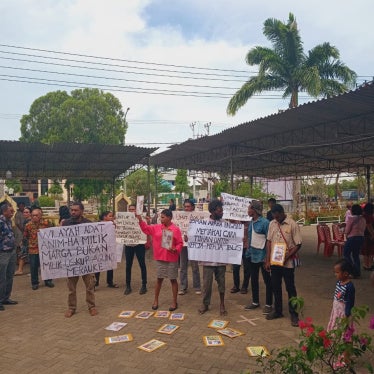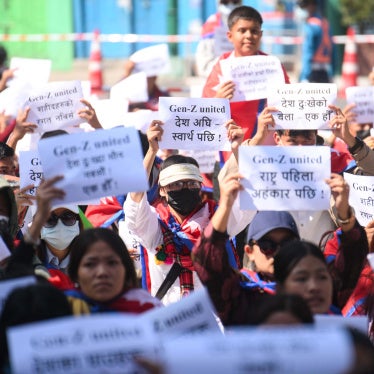President Karzai is in Washington this week to meet with President Obama and military commanders at the Pentagon. A main subject of the meetings will be the fate of peace negotiations with insurgent forces and the size of US military forces after a planned military drawdown is completed in 2014.
But while the two leaders meet they may want to consider why these topics are still relevant in 2013. Over a decade after U.S. forces arrived, it may be time to start considering new and different approaches to strategy and policy in Afghanistan. And one idea in particular is to begin listening more to civil society, who have been working in Afghanistan far longer than the United States military, and who will remain there after they are gone.
For more than ten years, human rights groups--and ordinary Afghans from across the country--have pointed out that the key to progress in Afghanistan lies in sidelining abusive commanders, promoting good governance, and protecting the rights of womenand minorities.
In 2002, I co-wrote a report on security and human rights in Afghanistan one year after the creation of a post-Taliban government. At the time there were growing concerns among many Afghans that the rebuilding of state institutions in Afghanistan was faltering in key areas such as human rights, public security, the rule of law, and economic reconstruction.
A primary problem, we said, was "the continuing power of Afghanistan's warlords." In the report we criticized international actors for squandering opportunities to set up unified civilian control of security apparatus and government institutions. The United States and its allies had instead reestablished a system of "endemic military feudalism" in which "regional and local military commanders, many of whom still receive arms, money, and political support from the United States and some of Afghanistan's neighbors, filled the vacuum created by the overthrow of the Taliban." Warlords now represented the "primary threat to peace and stability in the country," we wrote.
In meetings with US officials at the time, we warned that the situation raised the risk of Taliban resurgence and armed conflict between warlords, a future civil war. We were treated politely, but considered alarmist. Few of our recommendations were heeded. The United States never pressed for, and the Afghan government never acted to sideline commanders, like militia commander and now Vice-President Mohammed Fahim, and local commanders from other factions from Mazar-e Sharif to Gardez. Karzai cut deal after deal with people whose names make most Afghans' skin crawl.
Today, U.S. and Afghan security forces still depend on poorly trained local militias to supplement security forces in many provinces (even as, over the years, large swaths of the country entrusted to local forces fell into disputed or outright Taliban control).
Meanwhile, US influence, with the planned military drawdown into 2014, is decreasing. Many in the Obama administration appear to have given up trying to improve the situation, arguing that the most to be accomplished is avoiding serious security degradations after 2014.
Yet donor influence is still significant and can make a major difference--if donors make the welfare of ordinary Afghans their main goal. There is still much that can be done.
To start, Obama and Karzai can agree that so long as corrupt warlordism is at the heart of the Afghan government there is little chance of real progress. Obama can urge that verifiable steps be taken to remove those with the worst records from positions of power, while adopting long mooted vetting measures for the security forces. Until ordinary Afghans trust the army and police, Taliban recruitment will benefit and the security situation will remain tenuous.
Karzai can pledge to ensure that women leaders and representatives from organizations such as the Afghanistan Independent Human Rights Commission are given substantive roles in any negotiations with insurgents, to ensure that basic rights of all Afghans are fully considered. It is imperative that strong voices be at the table to safeguard rights.
Obama can also promise that US support will continue for initiatives promoting rule of law, good governance, and human rights--in particular women's rights. Already in 2012, cuts in non-military assistance were being made. Important gains for women's rights are at risk. Key areas to safeguard include continued support for legal assistance, judicial and prosecutorial training, hiring of women in security posts, and shelters for women and girls fleeing abuse or forced marriage. International assistance is particularly vital for shelters because the Afghan government refuses to support them.
After the United States and its allies are largely gone, ordinary Afghans will still struggle against flawed and abusive government structures. The United States and its allies should pledge to continue support to the institutions, from the human rights commission to internal oversight bodies in the police and military, to help them do so.
It is important to acknowledge that the Taliban's gains in Afghanistan have in large part been a reflection of government failure. The United States and its allies owe it to Afghan citizens to redouble efforts to ensure the strongest possible democratic institutions are in place to protect them--not just from the Taliban, but from the Afghan government itself.
John Sifton is the Asia advocacy director at Human Rights Watch.








